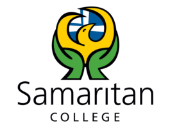Student Support
At Samaritan College we cater for all students and recognise their individual talents and gifts. We provide positive opportunities to develop and nurture each individual child, in a way that caters for their unique abilities.
We acknowledge that there will be a variety of learning needs in every classroom, and adopt an inclusive model of education. Our classrooms accommodate those with diagnosed disabilities and learning difficulties under the guidance of our Inclusive Education Team.
Samaritan College is committed to the inclusion of all students. At the time of enrolment, our Principal and Inclusive Education Team liaise closely with parents of students with a disability to ensure their needs are met. This includes collaborative conversations with our Catholic Education office personnel, and is followed up with a Personalised Plan for Learning.
Throughout the year, student’s needs are continuously monitored and evaluation of the learning program and reviews take place. Families are encouraged to engage Allied Health Professionals (eg; Occupational Therapists, Speech Therapists etc.) to work with their children in the school environment throughout the day, and in consultation with their child’s teacher and other staff.
In addition to classroom support, our students have access to programs supporting social and emotional wellbeing and the following Numeracy and Literacy programs.
The Quicksmart program aims to develop upper primary students’ speed of recall and accuracy in basic numeracy areas. By becoming faster and more confident in recalling basic number facts, students can use the limited capacity of their working memory to successfully tackle more challenging mathematical problems.
Make it Count is a 15-week numeracy intervention program for at risk Reception - Year 2 students. The program aims to develop and improve counting strategies through small group work. Students engage in the program with an Education Support Officer participating in three 20-minute sessions per week.
The Fountas and Pinnell, Levelled Literacy Intervention (LLI) program is a maximum 18-week program for at risk Reception- Year 2 students; with a focus on Year 1 students at the beginning of the year. The program aims to develop and improve students reading strategies, comprehension and written work.
The Macquarie Literacy (MacqLit) program is a reading intervention program for at risk middle/upper primary students; with an initial focus on Year 5 students. The program has a focus on phonics or word identification. It aims to improve students’ phonemic awareness, phonics, fluency, vocabulary and comprehension skills. MacqLit has been developed by MultiLit, a research-based initiative of Macquarie University, who have been producing reading programs for over 20 years.
The Learning Assistance Program (LAP) is a wellbeing program designed to support students in the areas of social-emotional wellbeing, and in some cases academic support. LAP is run by volunteers, who work to develop meaningful and long-lasting relationships with our students.
Wellbeing Resources and Programs at Primary
Life Skills GO, designed in collaboration with educators, is an easy-to-use emotion and wellbeing data collection tool that measures student readiness to learn, supported with a comprehensive library of evidence-based and curriculum aligned wellbeing and mindfulness resources.
Supporting Australian school communities with evidence-informed resources and activities for a proactive approach to bullying prevention and education.
The 'Peaceful Kids' program is a Mindfulness and Positive Psychology based program to lessen anxiety and stress and increase resilience in children. This program helps children to build their emotional resilience, so they are better equipped to deal with the day-to-day stresses that life brings them.
Catholic Education SA ‘Classroom Pulse Checks’
Every one of us experiences ups and downs in our life. Each term, Catholic Education SA will undertake a Classroom Pulse Check In.
The purpose of the Classroom Pulse Check In is to find out how students are feeling about their experience of school.
Students will each be asked some simple questions about:
- Identity
- Learning
- Relationships
- Belonging
Our aim is simply to “check in” with our students and measure how they are feeling.
Your child’s responses will help us to identify any potential social, emotional or learning needs that they may have.
They will also be used by Catholic Education SA to help highlight trends across Catholic Schools that may need to be addressed.


